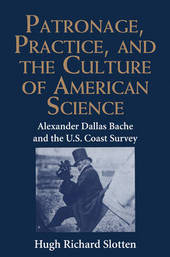
|
Patronage, Practice, and the Culture of American Science: Alexander Dallas Bache and the U. S. Coast Survey
Hardback
Main Details
| Title |
Patronage, Practice, and the Culture of American Science: Alexander Dallas Bache and the U. S. Coast Survey
|
| Authors and Contributors |
By (author) Hugh Richard Slotten
|
| Physical Properties |
| Format:Hardback | | Pages:244 | | Dimensions(mm): Height 234,Width 156 |
|
| Category/Genre | History of science |
|---|
| ISBN/Barcode |
9780521433952
|
| Classifications | Dewey:306.40973 |
|---|
| Audience | | Professional & Vocational | |
|---|
| Illustrations |
26 Halftones, unspecified
|
|
Publishing Details |
| Publisher |
Cambridge University Press
|
| Imprint |
Cambridge University Press
|
| Publication Date |
24 June 1994 |
| Publication Country |
United Kingdom
|
Description
In this book, Hugh Richard Slotten explores the institutional and cultural history of science in the United States. The main focus of the book is an analysis of the activities of Alexander Dallas Bache--great grandson of Benjamin Franklin. Bache played a central role in the organization of a number of key scientific institutions, including the American Association for the Advancement of Science, The Smithsonian Institution, and the National Academy of Sciences. In the middle of the nineteenth century, Bache became the most important leader of the scientific community through his control of the United States Coast Survey, which he superintended from 1843 until his death in 1867. Under Bache's command, the Coast Survey became the central scientific institution in antebellum America. Using richly detailed archival records, Slotten pursues an analysis of Bache and the Coast Survey that illuminates important themes in the history of science in the United States, including the interrelationship among political culture, patterns of patronage, and the institutional practice of science in the United States.
Reviews'Hugh Slotten's lucid and perceptive work deepens our understanding of the scientific enterprise in 19th-century America.' Paul Boyer, University of Wisconsin 'All readers will take pleasure in his broad research, lucid narrative, and gift for synthesis.' John W. Servos, Amherst College 'Slotten integrates the history of science into the history of American culture, pointing out the tensions between elitist professionalism and democracy.' Daniel Walker Howe, Oxford University ' ... timely and well-written book.' New Scientist
|